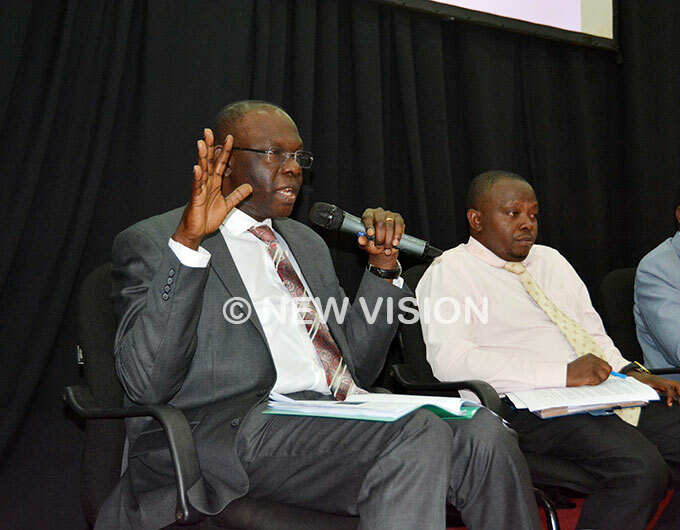Ugandans harvesting rain water to cut costs
Sep 25, 2019
According to Marie Nanyanzi, the programme officer of Twaweza, a Non-Governmental Organisation majority of households (60%) with piped water surveyed say sh3,000 per unit (1000 litres) is too high.

SANITATION
The cost of pipe water is too expensive forcing some Ugandans to resort to harvesting rainwater.
This is contained in a report released by Twaweza in conjunction with Uganda Water Sanitation Network (UWASNET).
According to Marie Nanyanzi, the programme officer of Twaweza, a Non-Governmental Organisation majority of households (60%) with piped water surveyed say sh3,000 per unit (1000 litres) is too high.
Addressing participants during the release of the report at Silver Springs Hotel in Kampala, Nanyanzi revealed that the actual price to domestic consumers is sh3, 500 per unit.
 The commissioner for rural water at the water ministry, Eng Joseph Eyatu (left) and Stephen Kayanja from the health ministry addressing participants during the release of a report on water and sanitation at Silver Springs Hotel in Kampala. (Photo by Francis Emorut)
The commissioner for rural water at the water ministry, Eng Joseph Eyatu (left) and Stephen Kayanja from the health ministry addressing participants during the release of a report on water and sanitation at Silver Springs Hotel in Kampala. (Photo by Francis Emorut)
She said the households would prefer paying either sh1000 or sh2000 per unit. To save money domestic consumers have resorted to harvesting rainwater as the high price of water bites.
According to the report eight out of 10 households 78% harvest rainwater and it's common among the urban dwellers at 79% with wealthier households at 84% while the poorer households are at 66%.
The report also indicates that two out of 3 households treat water to make it safe to drink.
The report titled Leaving no one behind? Captures citizens' views and experiences on water, sanitation and hygiene.
The data was collected from 1,845 respondents in the eleventh round of phone calls to Sauti Za Wanainchi panel conducted between June 24 and July 5 this year.
She informed the audience that among households 51% that access water from the public tap consider sh100 per a 20 litres jerry can too expensive.
However, said the head of corporate and public affairs at National Water Sewerage Corporation (NWSC) said the water is cheaper at sh1, 060 per unit for the urban poor.
Apedel explained that a 20-litre jerrycan from the public pipe costs sh25 and this was directive from the President Yoweri Museveni.
The report also indicates that access to piped water sources has declined from six out of 10 urban households to 61% in 2000 to five out of 10 in 2017.
But Apedel dismissed this saying that instead, the NWSC has provided piped water to 263 urban areas from 26 in the last five years.
"Where are those so-called researchers getting their data?" Apedel asked.
The report findings show that Uganda is far from achieving the Sustainable Development Goals (SDGs) target of universal access to water sources.
"To achieve these targets will require a rapid and major expansion in access to piped water," Nanyazi told the audience.
The treatment method is boiling water before drinking. On access to safe water, the report shows that 75% of households access to water from an improved source.
The main sources of safe drinking water are piped water, public tab, rainwater, protected spring and protected well.
On sanitation the report points out that access to improved latrines is higher in urban areas at 98% than rural areas at 85%.
It shows that it is higher in wealthier households at 99% than poorer households at 78%.
Responding to the report water experts observed that more needs to be done especially investing more in the water sector.
The acting manager population and social sector planning at National Planning Authority (NPA) Sarah Birungi Nahalamba, proposed coming up with strategies of innovating, financing to provide safe and clean water.
She pointed out that instead of government spending billions of shillings treating preventive diseases the resources should be channelled to improved access of safe water.
She said there is need to have a paradigm shift from sector approach to programme based.
The commissioner for rural water in the ministry of water, Eng Joseph Eyatu proposed that use of technology such as solar would help in alleviating the water sources gaps.
He also suggested that harvesting rainwater using mangoes and orange trees should be explored.
